Inside the
Fall Issue:
All Because
of Harry...
Harry Chapin
Run Against Hunger
Be Not Afraid
An Extraordinary
Friendship
Larry Austin Helps Keep
Harry’s Long Island
Dreams Alive
Fighting AIDS
in Ethiopia:
One Person
Making a Difference
Bonnie Raitt
Honored With
Chapin Humanitarian
Award
Readers Help
Those Affected by
Hurricane Katrina
Chapin Family
& Friends Plan
Concert in NYC
To Benefit WHY’s
30th Anniversary
Goat Tales
Doing Something
Letter to the Editor
WHY Hosts Free
Anti-Hunger Forum
October 18th
Country Store
Owner Celebrates
“Harry Chapin Weekend”
Circle! Calendar
Click below
to read previous
issues of Circle!
Fighting AIDS in Ethiopia:
One Person Making a Difference
Editor’s Note: Recently, Circle! received an email from Bruce Dennis, a Chapin fan who has joined the desperate fight to prevent the spread of AIDS in Ethiopia through a combination of counseling, education, medicine, and a critical electronic health information system. Dennis has generously shared with Circle! readers excerpts from the journal of his work on this project – a vivid illustration of the disappointments and successes associated with such a massive challenge. Like Harry Chapin’s willingness to take on world hunger, Dennis’ story provides a real world look at how one person, working with others, can really make a big difference.
by Bruce Dennis
November 20, 2003
I just finished my last feature film as producer and production manager. They say, “Nothing ventured, nothing gained.” In this case, it was “Everything ventured, nothing gained.” The day I returned from the memorial service for Dad in Chicago, we launched into the most challenging production we have ever done.
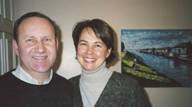
This was to be the consummation of eight years of preparation to start a film industry in New Brunswick. But our great hope, Zentropa, left us instead with unpaid bills, no wages, and a lot of misery. (Stay tuned for the release of the novel: “The Dragon of Denmark!”)
Sometimes God speaks with a still, small voice. Sometimes we are not listening when He does. This time it is more like God is slamming me up against the brick wall, holding me up by the scruff of the neck, and yelling in my face, “You quit this now, ya hear?!” My wife is in complete agreement, after living through eight years of continual financial crisis.
So I agreed. But what to do next?
A Heart for Africa
November 28, 2003
My mother noticed an ad in the Covenant Companion, looking for somebody to work in France. The ad wants somebody who is French-speaking, has a heart for Africa, and is communications savvy. Sounds intriguing. Will definitely follow it up.
November 30, 2003
I called André Orluc in Avignon. He sounds like the real thing, although I am not sure what exactly he is looking for. He has been working in Ethiopia for several years, and needs somebody to help him with the fundraising and communications. He says we really need to go and see him to understand what it is all about.
March 16, 2004
Mom decided, since she found the ad, she would pay our way to go to France and investigate the position. Even though we are virtually penniless, Nicole and I arrive in France. We are treated to the warmest of Christian hospitality by Stephanie and Francisco Ramos, Covenant missionaries in Paris.
March 19, 2004
We travel by train to Avignon to meet André and Vicki Orluc, shown at the Pont du Gard near their home. André and Vicki also introduced us to Jennie and Don Waterman and other individuals who are working in Africa whenever they can to support the true heroes of faith, the local people who give everything to help their neighbours in need.
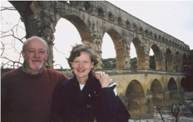
So what was The Job? To help André with his project in Ethiopia. He is a man with a mission. As a physician, he has always had a desire to help others, and has been working as a volunteer for many years in Ethiopia through the church planted by the SIM: the Kale Heywet Church. He is deeply concerned about the HIV/AIDS problem in Ethiopia, particularly the most vulnerable: children and mothers with AIDS.
His response: he has set up a program through his small organization which receives free medications – Viramune and Determine tests – to distribute in Ethiopia, specifically in the Dilla region, an area with a population of about 350,000 in the south of Ethiopia. He is frustrated because he is not able to get the medicine to enough people – and Axios, the supplier, requires that there be a reliable system in place to document the efficient distribution of the drugs they supply.
His goal is to keep mothers with HIV/AIDS alive so they can raise their children. He and Vicki have even adopted an Ethiopian boy, Nathan, seen here in St-Rémy, Provence. But it has been an overwhelming challenge, even though the Ethiopian Kale Heywet Church (5.2 million members) has contributed enormous resources to the task. Volunteers like André feel their contribution is so small, it is like trying to hold back a tsunami with a Popsicle stick.
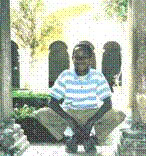
And with 6,500 people dying every day in Africa, it is a seemingly unstoppable tidal wave of death washing over the continent.
Putting it Together
April 1, 2004
Now we are safely back from France – I follow up on a brainstorm I had while traveling back in the plane. There is a small company in Fredericton – Accesstec Inc.—that does great work in process improvement, particularly in the health sector—and they have some incredible software designers. I was aware they were developing a full-fledged electronic health information system in Belize – maybe it could work for AIDS in Ethiopia.
July 2, 2004
The Accesstec system, ACSiS, is now operational throughout Belize, operating from day one without any glitches or hang-ups.
After several meetings, Tristan and Nick Rutter of Accesstec have decided the company can proceed to investigate the possibility of setting up a similar system in Ethiopia—if the Ethiopian Kale Heywet Church (EKCH) will write a letter of commitment to Accesstec demonstrating genuine interest in the program.
August 14, 2004
Accesstec has had several conversations with Dr. Tim Teusink, missionary working with the Kale Heywet Church in Addis Ababa, about the needs there, and they now have a short prospectus on what they could do to enable and enhance the existing program of the Kale Heywet Church: Medan ACTS: Save a Generation. I continue to ask for a letter from the church in Ethiopia, but they are hesitant to send a letter or make any kind of a commitment without meeting the people at Accesstec first. As Dr. Tim explains, it’s the way they do business in Ethiopia – all face-to-face over a long period of time.
Accesstec feel they don’t want to spend any more effort or time on this project until they have a clear commitment from the EKCH that they want their system.
October 25, 2004
Desta Demessie, on behalf of the church (EKCH), sends a letter to Accesstec. However, the invitation was not strong enough from the Accesstec point of view to warrant a trip to Ethiopia. Dr. Tim Teusink, who has been corresponding with us regularly, says the letter is as strong as we will ever get. He says that, from an Ethiopian point of view, the letter is an unusually strong indication of interest to a group of people they have never met face to face.
December 6, 2004
Dr. Estifanos, the director of the AIDS programs for the Kale Heywet Church, who is now in Norway working on a PhD in Public Health, sent an e-mail today. He says very emphatically that the church needs and wants the Accesstec electronic health system, and named the people already in place to make sure it works.
December 7, 2004
On the basis of such a strong letter from Dr. Estifanos, Tristan and Nick of Accesstec decide to go ahead and make plans to take a trip to Ethiopia.
December 8, 2004
I finally hear from Derrick Milburn of CIDA. I met with him in August in Ottawa to see how the Canadian government might be able to contribute to this project, since the government has announced publicly they are putting a lot of money into AIDS in Africa, particularly in Ethiopia. Derrick is the man in charge of AIDS programs for Africa, so he seemed the appropriate person to contact.
He was very friendly and said he would look into it. In his e-mail today, he says CIDA’s Ethiopia Program really can’t provide any funding to the Ethiopian Kale Heywet Church for the electronic health system, because “your project does not fit its programming framework which is focused on food security and governance.”
December 10, 2004
I have started making plans for the trip. We plan to leave the 19th of January and return the 27th. I have contacted a number of other agencies and interested persons who will be in Addis Ababa at that time, and we can also make a swing through Kenya, Tanzania, and Swaziland to meet other interested parties. I expect to travel with Dr. Michael Graven, a neo-natologist who was involved in the Belize setup.
As a professor of Health Informatics, he is keenly interested in seeing this system put into place for other countries, especially in view of the tremendous need in the area of HIV/AIDS, tuberculosis and malaria. He is volunteering his time for the project. Tristan has agreed to cover the cost of my ticket, with the understanding I will repay him when I can.
February 4, 2005
In preparation for the trip, I continue to monitor HIV/AIDS related documents issued by the Ethiopian government and NGOs active in the country. I just found a publication entitled “Guideline for Implementation of Antiretroviral Therapy in Ethiopia” published by the Ministry of Health in January 2005.
This document provides a great deal of information relating to the current requirements and desires of the Ethiopian government in implementing an effective means of delivering ART to the Ethiopian population.
On the Way to Ethiopia
March 1, 2005
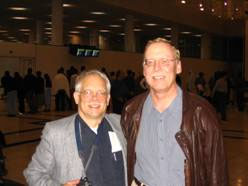
Bruce Dennis and Dr. Tim Teusink at airport
Dr. Tim Teusink soon arrived to meet us and drove us to the SIM Guest House. Tim came and took us to his office for a Powerpoint overview of the AIDS situation in Ethiopia.
He said that in spite of estimates that up to 24 percent of the urban population of Ethiopia is infected with HIV, there has been no treatment available for ordinary people in Addis Ababa until February of 2005, and that in very limited quantities (about two percent of the infected population get treatment). Uganda’s rate has dropped from some 30 percent of the population to less than 10 percent, from interventions such as abstinence and the reduction of the eligible marriage age. Condoms are only 85 percent effective in preventing AIDS.
The Ethiopian Kale Heywet Church under Dr. Tesfa Yacob, General Secretary, has taken strong measures to combat the disease. The Kale Heywet Church came out of the work of SIM (originally Sudan Interior Mission, now Serving in Mission) beginning in the 1920s.
The church now has over 5 million members and has established 34 health clinics and six hospitals throughout Ethiopia. They have developed a strong anti-AIDS educational campaign (Medan (Save a generation) ACTS (AIDS Control Treatment Support), and are just now starting PMTCT (Prevention of mother-to-child transmission) and ART (Anti-retroviral Therapy) programs.
Dr. Estifanos Biru Shargie heads up the HIV/AIDS program, and he has been interested in an electronic health system for some time as a tool to enable the implementation of PMTCT and ART programs. Such a system is now a necessity, as the Kale Heywet Church has been requested by the Health Bureau of the City of Addis Ababa to deliver PMTCT programs to the entire city through their 23 health centers.
Through the Anti-AIDS clubs in schools, young people are taught to avoid infection through abstinence, through the Care and Support component for OVC (Orphans and Vulnerable Children), they work with existing families to care for the orphans, giving treatment for common infections, providing informal schools run by volunteers, and running a program for IGAs – Income Generating Activities, such as shoeshine boxes, cart and horses, tea shops, etc.
March 2, 2005
We met Claudia Rizzi, Producer of PBS’s Frontline – she was working with Tim Teusink on a documentary to be aired next January on what is being done to prevent AIDS in Ethiopia. We were able to inform her about the Accesstec system when Tim pointed out that a lot of necessary information on AIDS is captured on paper but it can’t be analyzed because it can’t be accessed – one of the challenges that is met with a well-designed electronic health information system.
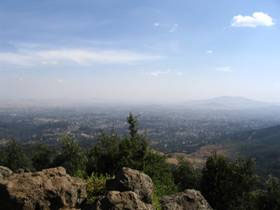
Addis Ababa from Entoto
Dr. Adamu said the Mayor had announced, in response to World AIDS Day, that the city would increase VCT centers from 80 to 200, and provide incentives to mothers to be tested for PMTCT by offering milk supply and medication cost so they could raise their children.
March 3, 2005
In the morning we visited the Kirkos Health Centre – the first PMTCT program operated in Addis Ababa by EKHC—with Dr. Henok. It serves a population of 300,000, approximately 10 percent of the city. On the basis of visits so far, they project 20,600 mothers will come for ante-natal care per year, of which 2,000 will be seropositive. Most will need financial support, at a cost of 6 Birr per mother per day (2190 Birr per year). 200 caregivers are needed at Kirkos to serve the population; each is paid 300 Birr per month.
In Dilla (population 250,000), Henok asked UNICEF to fund the care and support part of the program. They arbitrarily gave $140,121, which provided 500 Birr ($58 U.S.) per mother per year, less than a quarter of what they need for care, not to mention medication and food for themselves and their child.
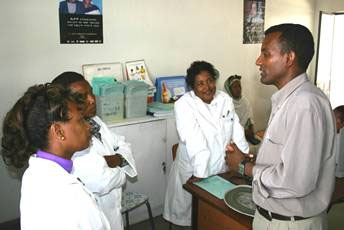
Dr. Henok Ghebrehiwok and nurses at Kirkos Health Centre
We had an appointment with Marian Casey, the Advisor on HIV/AIDS for the Horn of Africa – Sudan and Ethiopia. She said CIDA had initially planned to turn us away because the proposal did not mention any Ethiopian context or background, but when they realized we were coming to Addis Ababa, on the invitation of the Kale Heywet Church, and that the Kale Heywet Church was well qualified to deliver AIDS-related treatment programs such as PMTCT and ART, they made time for us.
She said she was not technically aware enough to benefit from an in-depth demo, but she did emphasize that the system would have to be robust and the hardware would have to be hardy to withstand the problems of Africa. The most robust telecommunications medium is the cell phone, so if data could be transferred through that network, the system could work. Ms. Casey referred us to a number of key people in Addis Ababa.
March 5, 2005
We met with Desta Demissie, who is Deputy General Secretary of Development for the Kale Heywet Church. We gave him an update on the meetings we had had and also asked for a letter of endorsement for the system.
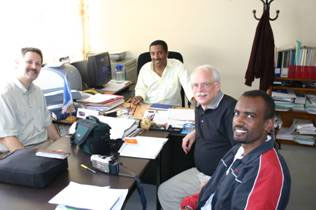
Dr. Mike, Desta, Bruce, Dr. Adamu
Within two weeks, we received a copy of the contract signed March 15, 2005, between KHC and the Health Bureau of the City of Addis Ababa, authorizing KHC to manage all the PMTCT clinics on behalf of the city. He also sent a letter from the KHC requesting that Accesstec be the sole provider of an electronic health information system to assist in administering the program.
March 7, 2005
I took video of two boys receiving ARV treatment at SIM, then went to the Task Force meeting with Dr. Adamu and Dr. Tim. After returning to SIM, Eden Afework accompanied me to meet two women with AIDS (one with a daughter) whom I interviewed on camera.
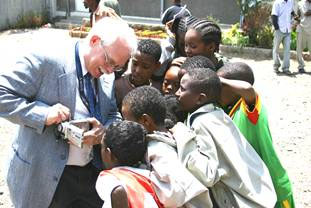
Bruce with kids at Bole Kale Heywet Church
The interviews were within walking distance of the SIM Guesthouse. Eden and I walked past the huge Black Lion hospital among the shanties in its shadow. The streets were narrow, but all paved with cobblestones, a gift from a wealthy woman who once lived there.
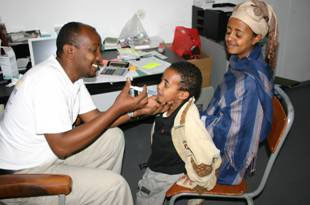
Theodoris Alemayehu giving ARV treatment to boy with AIDS
Although the smell of raw sewage was unavoidable, the people were clean and well dressed. Children followed us everywhere, asking to have their picture taken. Our first stop was at the home of a woman who had been a sex worker, but turned her life around when she met Jesus. She was not doing well this day.
She had been in pain and went to the hospital to see if they could adjust her medication. Unfortunately, they had lost her medical records and couldn’t give her any treatment at all. Yet another example of how an electronic health system would benefit so many people in this country. Nevertheless, as she lay there on her bed in a small room with one light bulb, her whole house, she spoke with conviction of how thankful she was for all she had received, especially the gift of eternal life. Before I left, we prayed together and we agreed to pray for each other.
The next visit was to Wude Fetene, 27, and her daughter, Selem Yohannes, 11. They told me that Wude came from a rural area to Addis Ababa to seek a better life. She met and married a man who, she found out later, had AIDS. Soon after their daughter, Selem, was born, he died. Selem was about seven years old when Wude started getting sick. As time went on, and she got worse, little Selem had to take care of her mother.
It was hard to find a place to stay, because nobody wants to rent to people with AIDS, but eventually they found a kind landlady who rented them a one-room shanty for 80 birr a month -- $11.78 CAD or $9.62 USD – which is ten times the usual rent for a space like that. Eventually, Selem contracted AIDS as well, and as sick as she was, her mother was even worse. When her mother could no longer get up out of bed, Selem looked for help and found the SIM headquarters not far from their home. Andy Warren Director of the Home Care program, took them under the care of his organization, and within three months, after being treated with ARVs, both Selem and her mother, Wude, are able to take care of themselves. Wude is looking for work, and Selem has started school.
This is a “good news” story that can be repeated over and over again if people are given the opportunity to receive treatment.
Unfortunately, even with the drugs available to treat their condition, HIV/AIDS patients cannot receive treatment unless there is a sophisticated surveillance system in place to follow them day by day and monitor their condition and adjust their dosages accordingly.
Thanks to the Accesstec system, such a solution is now possible. The Kale Heywet Church quickly responded by signing a contract with Accesstec to supply the system so they can expand and improve their treatment programs. They have also reached out to bring in two other important groups: the Mekane Yesus Church and the Ethiopian Orthodox Church. Together the three churches number 50 million members, and reach throughout the nation of Ethiopia. Training is taking place on a regular basis to give health workers the ability to reach as many HIV positive individuals with education, counseling and treatment.
The system is urgently needed, but we need approximately $350,000 USD to get the first prototype up and running in the Kirkos Sub-city Health Center. Then the pattern can be rolled out throughout Addis Ababa and into the rest of Ethiopia, ultimately making it possible to save 60,000 lives or more every year. The total cost will likely be in the range of $15 million USD. It may seem like a lot, but in fact it represents a cost of less than 25 cents per person in Ethiopia.
What makes this even more exciting is that Ethiopia, along with many other nations, is looking for a way to enumerate the entire population. For a system that will do that, they are expecting to pay $4.00 USD per person. The Accesstec system will be able to fulfill all the functions necessary for a complete enumeration, PLUS provide all the requirements of a complete national health system.
The Accesstec system is one of the world’s most advanced systems with a comprehensive scope of capabilities. It can be deployed quickly (12 weeks to completion of the first fully functional health unit) at a very reasonable cost (less than 35 ETB or $4 per person), and will enable Ethiopia to accomplish many tasks at once:
- Enumerate every Ethiopian
- Provide every citizen with a unique citizen/patient identity card and health record
- Design individual patient care plans
- Access all health records at every government health facility by users with appropriate security clearance
- Immediately access local, regional and national data for effective public health and epidemiology planning
- Manage the distribution of pharmaceuticals and assess their effectiveness
- Create a National Health Information System that is superior to any that presently exist in the USA, the UK or Canada
In short, this Health Information System will enable the Ethiopian government—and the groups designated to deliver its health programs—to consolidate and focus the human and material resources at their disposal by managing the pharmaceuticals, delivering effective long-term care plans for all chronic diseases, including HIV/AIDS, and developing improved national public health strategies based on real-time epidemiologic data.
The Kale Heywet initiative is called MEDAN ACTS – “Save a generation through AIDS Counseling, Testing and Treatment.” With the Accesstec system, we can help to accomplish this worthy objective. We are doing all in our power to find the funding for this system, but we have encountered stiff resistance and even opposition from the United States government agencies working in Ethiopia.
Even though the Accesstec system exceeds the requirements set by PEPFAR, and no other system, existing or proposed, can compete in quality or price, the Americans will not consider the Accesstec system because it is not an American product. The U.S. policy is that every dollar spent on foreign aid must generate at least two dollars for the U.S. economy.
We are reminded of David and Goliath, and realize that we can only succeed in this endeavour if we remember that “the Lord saves not with sword and spear; for the battle is the Lord’s and he will give you into our hand.”
There are those in positions of influence who oppose our work – even to the point of telling HIV positive mothers to breastfeed their babies and transmit the virus to them, knowing full well that the children will get sick as well. We need your prayers to succeed, for we will never win if we rely on the weapons of temporal power. Please keep the lives of these women and children in your hearts, and pray that the funding will come soon, so that no more will be lost.
It appears now that the project keeps growing in scope – so the Ethiopian government can use it for their national health system as well as their national identity system. But that keeps putting off the initial phase.
We need $350,000 right now in order to get the work started, so we can actually treat the mothers and children with AIDS. That is the imperative as I see it, and the only way we can get the initial funding is by finding the people who want to help.
The government and NGO agencies who fund the big projects take many months and years, and this system could be started tomorrow (Monday) and operating 12 weeks from today if we had the first $350,000 in place.
You can make a difference! Make an on-line donation to support this effort by clicking on www.stmattluth.com and contribute online from anywhere in the world through the Canadahelps buttons throughout the site.
Watch for the Next Issue of Circle! on December 7
